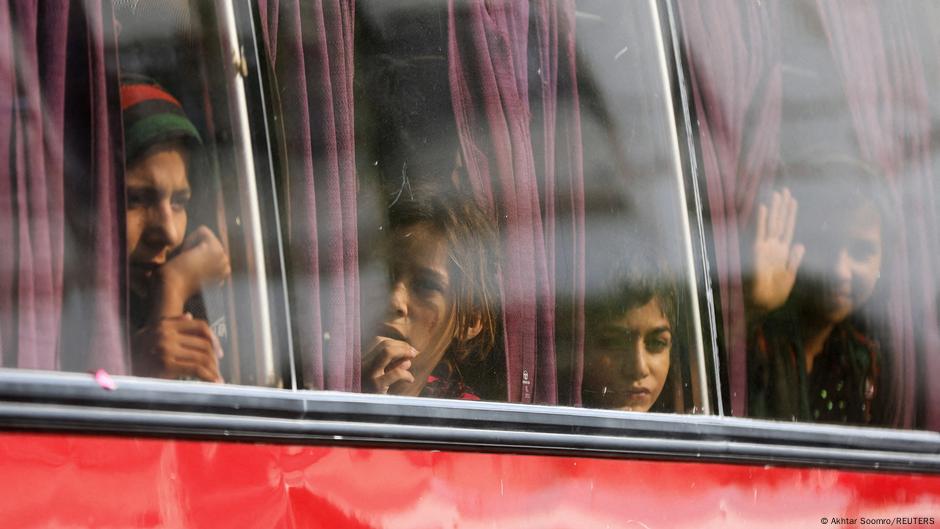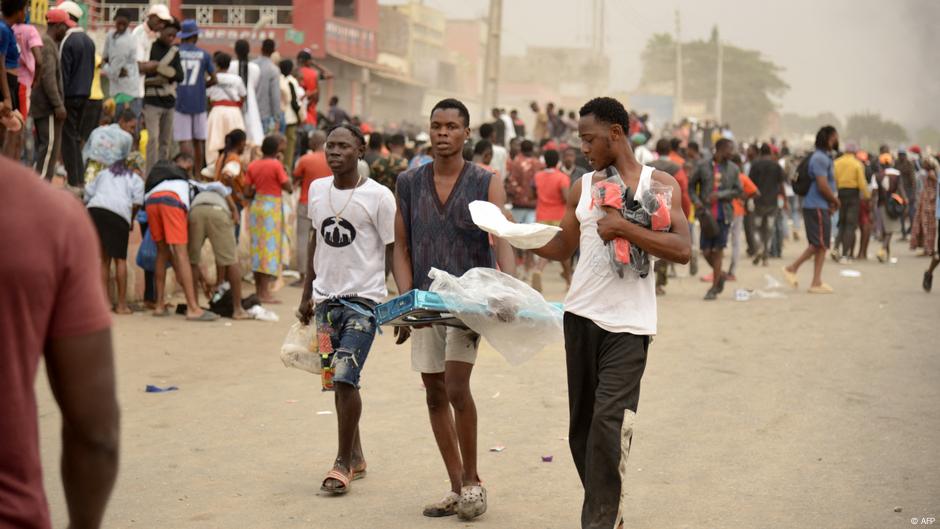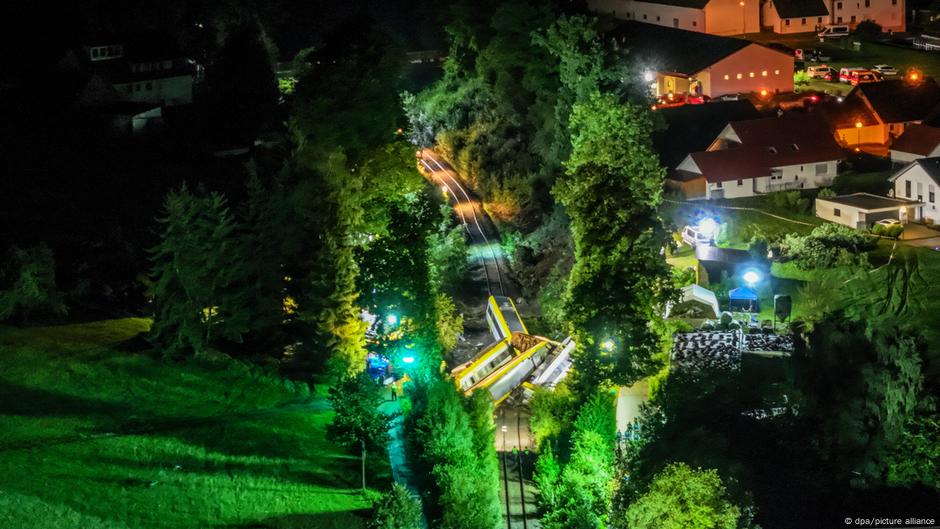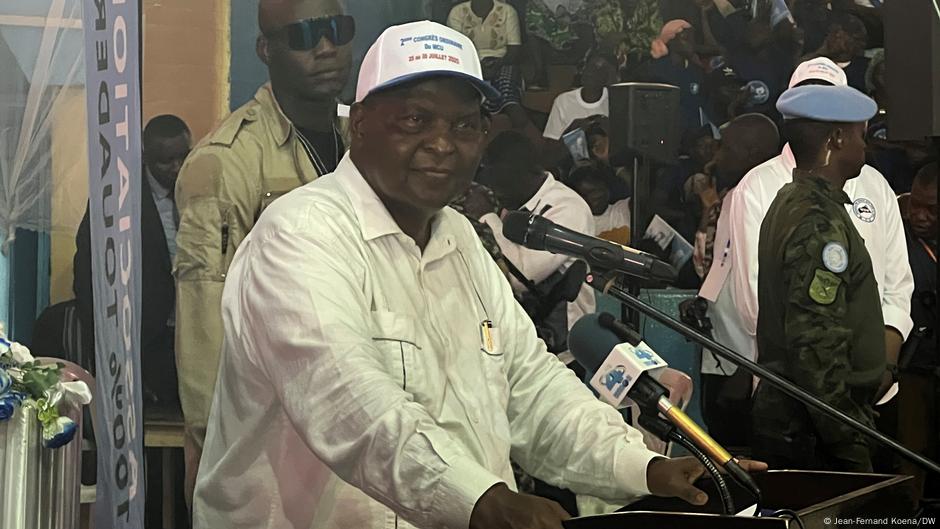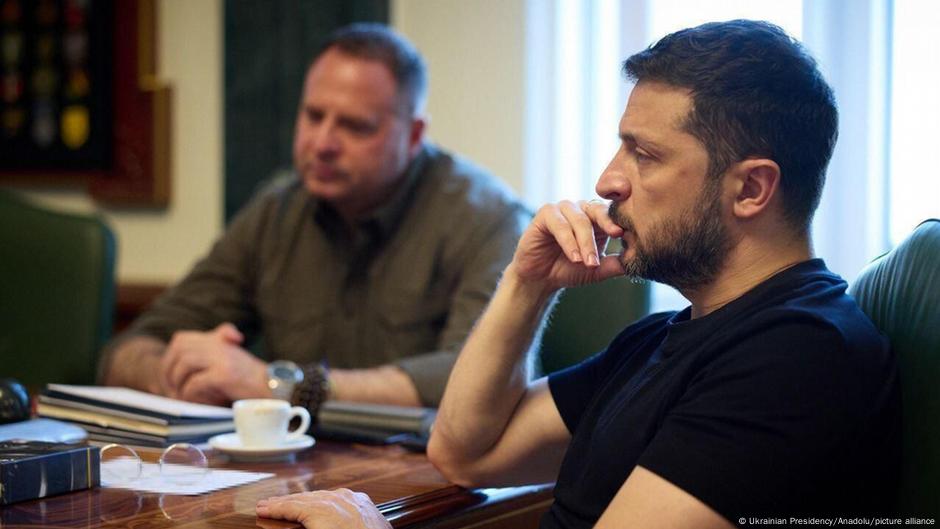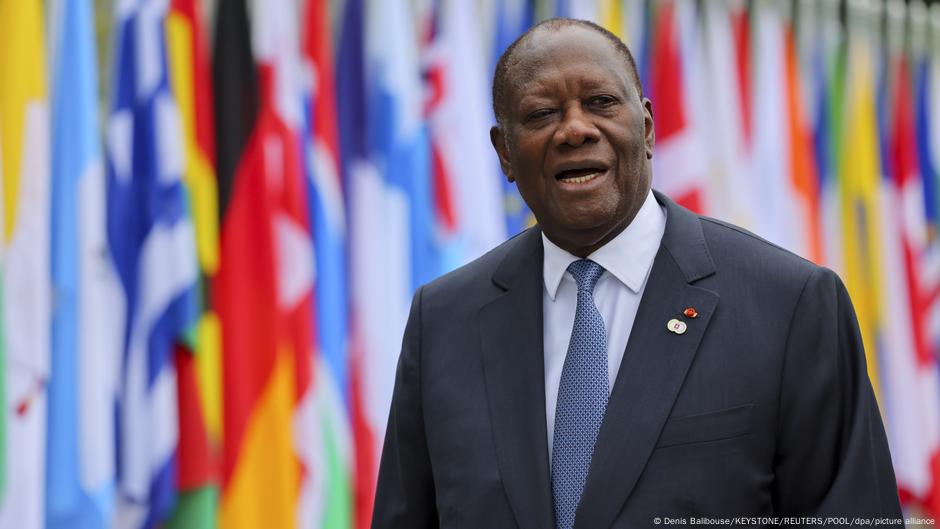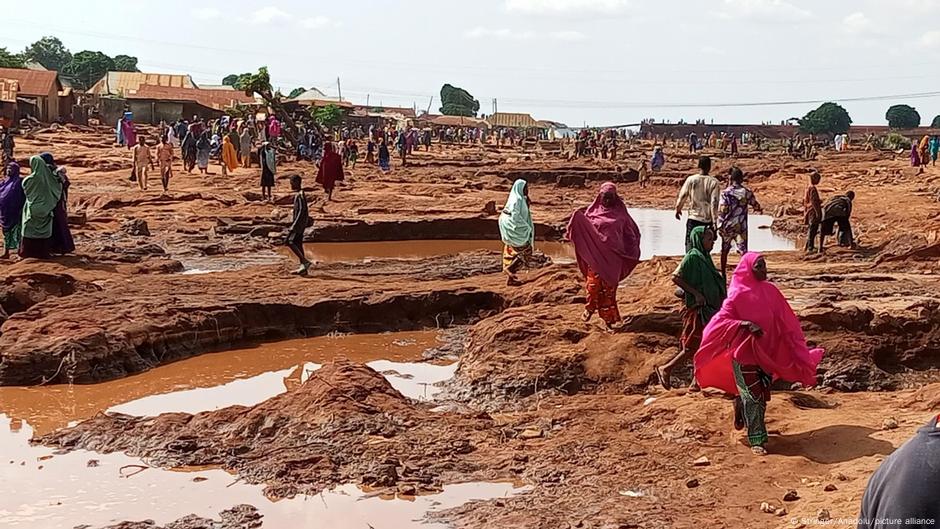Meanwhile, a Russian attack has killed at least 16 inmates at a prison near Zaporizhzhia, Ukrainian officials have said, with at least 35 more injured in the overnight bombing.
Eight strikes were reported as likely involving glide bombs, which also damaged nearby homes and left buildings inside the complex in ruins.
The Ukrainian president’s chief of staff condemned the attack as a war crime.
Here is a roundup of events from Russia’s war in Ukraine on Tuesday, July 29.
Skip next section Trump says Russia to face sanctions in 10 days if it does not move to end Ukraine war07/29/2025July 29, 2025
Trump says Russia to face sanctions in 10 days if it does not move to end Ukraine war
US President Donald Trump said that unless Moscow made progress toward ending the war in Ukraine in the next 10 days, he would begin enforcing tariffs and other actions against Russia.
The statement came a day after he shortened his original 50-day deadline for action from Russia to “10 or 12 days,” and was after he had not received any response from Moscow.
Earlier Tuesday, the Kremlin said it had “taken note” of the new deadline (see entry below).
Trump also said he was not worried about the potential impact of Russian sanctions on the oil market or prices, saying the US would boost domestic oil production to offset any impact.
Trump says Russia will face sanctions in 10 days if Moscow does not move to end the war in UkraineImage: Andrew Harnik/Getty Images https://p.dw.com/p/4yDlBSkip next section Russian billionaire fails to overturn UK sanctions07/29/2025July 29, 2025
Russian billionaire fails to overturn UK sanctions
Billionaire oil tycoon Eugene Shvidler on Tuesday lost his appeal against sanctions imposed on him by the UK over Russia’s full-scale invasion of Ukraine.
The ruling at the UK’s Supreme Court also makes it difficult for similar challenges to succeed.
Russian-born Shvidler, who is a UK and US citizen, was sanctioned over his connection to former Chelsea Football Club owner Roman Abramovich, as well as his previous role as a director of London-listed Russian steel producer Evraz.
Shvidler appealed to the Supreme Court. His lawyers argued that others with greater involvement in business of importance to Russia were not sanctioned, citing BP’s previous joint venture with Rosneft, a Russian integrated energy company focused on the exploration, production, refining, and distribution of oil and gas.
The Supreme Court rejected the appeal by a four-to-one majority in a ruling that Shvidler said “brings me back to the USSR.”
With the decision, the top court maintains its 100% record of rulings defending Russian sanctions.
https://p.dw.com/p/4yDcESkip next section Poland: Jailed Colombian man set fires on orders from Russia07/29/2025July 29, 2025
Poland: Jailed Colombian man set fires on orders from Russia
Chi-Hui Lin with dpa
Polish authorities said a jailed Colombian man started two fires in Poland on behalf of Russia last year.
The 27-year-old man stands accused of setting fire to two warehouses in Warsaw and Radom in 2024, a spokesman for the Interior Ministry in Warsaw said.
The fires were quickly extinguished, and no one was injured in either case.
The Colombian man had previously been trained by a person with links to Russian secret services, according to the Interior Ministry.
The public prosecutor’s office is now investigating the man for working for a foreign secret service and for terrorism.
https://p.dw.com/p/4yD7cSkip next section Zelenskyy signs law allowing citizens over 60 to join military during wartime07/29/2025July 29, 2025
Zelenskyy signs law allowing citizens over 60 to join military during wartime
Chi-Hui Lin with Kyiv Independent
Ukrainian President Volodymyr Zelenskyy signed a bill on Tuesday allowing citizens over 60 to voluntarily join the military while the country is under martial law.
The new law allows people over 60 to sign one-year military service contracts if they pass a medical exam and receive approval from a unit commander.
Each recruit will face a two-month trial period, during which the contract can be terminated early if they are found unfit. While the law sets no maximum age for service, all contracts will automatically end when martial law concludes.
This measure expands Ukraine’s recruitment pool by enabling older volunteers to serve in non-combat and specialized roles in Ukraine’s ongoing manpower shortages.
Ukrainian President Volodymyr Zelenskyy has been looking for ways to expand the number of people serving in the militaryImage: Thomas Peter/REUTERS https://p.dw.com/p/4yD2eSkip next section Kremlin responds as Trump shortens Russia ceasefire deadline07/29/2025July 29, 2025
Kremlin responds as Trump shortens Russia ceasefire deadline
The Kremlin has acknowledged a new ultimatum from US President Donald Trump, who has shortened his deadline for Moscow to move toward a ceasefire in Ukraine or face additional sanctions.
“We have taken note of President Trump’s statement yesterday. The special military operation continues,” Kremlin spokesman Dmitry Peskov said Tuesday during a press call, using Moscow’s official term for the war. He added, “We remain committed to a peace process to resolve the conflict around Ukraine and to ensure our interests in the course of this settlement.”
Trump, speaking Monday in Britain, gave Russia 10 to 12 days to show progress toward ending the war, citing frustration with the lack of results. “There’s no reason in waiting… We just don’t see any progress being made,” he said.
The revised timeline accelerates a warning Trump issued on July 14, when he threatened new sanctions on Russia and countries purchasing its exports within 50 days — a deadline that would have expired in early September.
Trump, who has spoken with President Vladimir Putin multiple times since returning to the White House in January, also said he is “not so interested in talking anymore.”
https://p.dw.com/p/4yBbQSkip next section Missile strikes kill 4 in Ukraine’s Dnipropetrovsk region07/29/2025July 29, 2025
Missile strikes kill 4 in Ukraine’s Dnipropetrovsk region
Missile and drone attacks have killed at least four people and wounded several others in Ukraine’s central Dnipropetrovsk region, regional officials said Tuesday.
A strike on the city of Kamyanske killed two people, injured five, and damaged a hospital, according to regional military head Serhiy Lysak. Another person was killed and several wounded in an attack on the Synelnykivsky district.
In a separate strike on Velykomykhaylivska late Monday, a 75-year-old woman was killed and a 68-year-old man injured. A private home was also damaged, Lysak said.
Citește mai multe știri pe top10stiri.ro
https://p.dw.com/p/4yBIiSkip next section Russian shelling kills 5 in Kharkiv07/29/2025July 29, 2025
Russian shelling kills 5 in Kharkiv
Russian shelling has killed five civilians and wounded three others in Ukraine’s northeastern Kharkiv region, local police said Tuesday.
The regional capital, also called Kharkiv, is Ukraine’s second-largest city and serves as a major economic and cultural hub.
Russia has hit Kharkiv with multiple strikes in recent months, including one that damaged a maternity ward in July.
https://p.dw.com/p/4yBOOSkip next section Zelenskyy says prison strike was deliberate, urges pressure on Russia07/29/2025July 29, 2025
Zelenskyy says prison strike was deliberate, urges pressure on Russia
Ukrainian President Volodymyr Zelenskyy has said that a Russian airstrike on a prison near Zaporizhzhia was “deliberate” and not accidental, calling for increased international pressure on Moscow to end its attacks.
“It was a deliberate strike, intentional, not accidental,” Zelenskyy said Tuesday in a social media statement. “The Russians could not have been unaware that they were targeting civilians in that facility.”
He added that Russia “must be compelled to stop the killing and make peace.”
https://p.dw.com/p/4yBBNSkip next section Ukrainian drone strike kills 1 in southern Russia07/29/2025July 29, 2025
Ukrainian drone strike kills 1 in southern Russia
A Ukrainian drone strike has killed one person in Russia’s Rostov region, the area’s acting governor, Yuri Sliusar, said Tuesday.
Sliusar reported that the victim died after a car was hit on Ostrovsky Street. He said multiple locations were targeted in the overnight attack, including Salsk, Kamensk-Shakhtinsky, Volgodonsk, Bokovsky, Tarasovsky, and Slyusar.
Debris also struck the Salsk train station, damaging both a freight and a passenger train. Passengers were evacuated, and no additional injuries were reported.
https://p.dw.com/p/4yAZUSkip next section Russian airstrike kills 16 inmates in Zaporizhzhia prison07/29/2025July 29, 2025
Russian airstrike kills 16 inmates in Zaporizhzhia prison
Ukrainian officials say a Russian airstrike has killed at least 16 prisoners at a detention facility near the front-line city of Zaporizhzhia.
Another 35 inmates were injured in the overnight attack, which also damaged multiple buildings within the complex, according to regional governor Ivan Fedorov.
Federov said the area was struck eight times overnight, likely by Russian glide bombs, and nearby homes were also hit. The wounded were receiving medical care, he added.
Glide bombs, launched from Russian aircraft over occupied territory, strike Ukrainian targets with little warning. Their speed and range make them difficult for Ukraine’s air defenses to intercept while keeping the launch aircraft out of range.
Ukrainian President Volodymyr Zelenskiy’s chief of staff, Andriy Yermak, condemned the strikes as “another war crime” committed by Russian President Vladimir Putin’s Kremlin.
“Putin’s regime, which also issues threats against the United States through some of its mouthpieces, must face economic and military blows that strip it of the capacity to wage war,” Yermak said on X.
Trump reduces 50-day deadline for Russia on Ukraine
To view this video please enable JavaScript, and consider upgrading to a web browser that supports HTML5 video
https://p.dw.com/p/4yARVSkip next section Welcome to our coverage07/29/2025July 29, 2025
Welcome to our coverage
Welcome to DW’s coverage of the latest developments in the Russian war on Ukraine.
You join us after Russia carried out eight strikes on the Zaporizhzhia region, hitting a prison where at least 16 people were killed.
The governor of Russia’s Rostov region also said one person had been killed in a Ukrainian drone strike there.
Stay with us for the latest news and analysis from the ongoing war.
https://p.dw.com/p/4yAS0Show more postsRichard Connor Reporting on stories from around the world, with a particular focus on Europe — especially Germany.Send us your feedback
Sursa: DW
